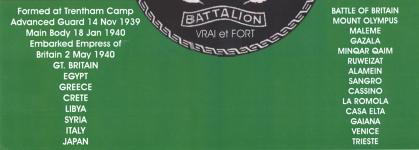TWENTY-SECOND TO NONE
The History of the 22nd (N.Z.) Battalion
By Terence Power Mclean
CHAPTER EIGHT
4 Mar– 31 Mar 1941
Preparation for War
There was little time. The enormous success in terms of ground and booty won and personnel captured of General Wavell’s spirited offensive into Cyrenacia in the last days of 1940 had become endangered by the threat of a German thrust into Greece. General Wavell of necessity re-arranged his desert forces and the Second NZEF and units which had fought in the campaign, were grouped in an expeditionary force intended for the defence of Greece. The battalion soon learned of the general plan. Within two days of its disembarkation, 617 strong, at 1610 hours on 5 Mar, it was told by Brigadier Hargest that the stay in Egypt would be short. “Much must be done in the time available” he said. The battalion already had done a little within half a day of arrival at Helwan camp some 20 miles south of Cairo. Col Andrew had the unit out upon a six mile route march, half of it over the strange, yielding unsatisfactory surface sand. The parade was followed by another march of eight miles, six of them over sand. There was compensation of the marching in leave until early morning in Cairo and there were sounds of incredible revelry in the city. But preparation for war was the primary concern. The essentials of he training programme were physical fitness, movement by day and night, weapon training, trench digging, anti-gas instruction and an inculcation of the offensive spirit. It was a point of interest that training in the Thompson sub-machine gun was assisted by a pamphlet which had been composed on the voyage from England by Lts CN Armstrong and HV Donald. The pamphlet was used in the battalion until the War Office pamphlet later became available. Within a week of arrival at Helwan on 13 Mar, topees and KD gear were issued, and on 15 Mar base kits were packed off to Maadi camp, a few miles to the north of Helwan on the road to Cairo. Between the two events, on 14 Mar, a violent storm made twilight of high noon when menacing walls of stinging, choking sand were blown in from the desert. Reinforcements were absorbed. The officer reinforcements included Captain Wooller, who was posted as second in Command of D Coy, and 2/Lt G McGlashan, who was appointed to command No 18 Platoon of the same company. On Sunday 16 Mar, tents were struck and the camp area cleaned. The battalion slept a cold night in the open, a blanket and a greatcoat to a man and entrained early in the morning for a journey of 140 miles to Amiriya, a stony, bare encampment within sight both of the Mediterranean and Alexandria, a few miles to the west. The interest of the journey was the incredible fertility of the Nile valley and the primitive, biblical methods of cultivation under fellahin. Two sandstorms and an air raid from Alexandria on 2 Mar were the principal diversions of the nine days spent in the camp. One storm occurred in the afternoon of a day set aside for a route march to the sea. The quality of marching caused excessive displeasure to the colonel and within two miles he ordered the column back to camp for lessons in the “bull ring”. The storm, with its cursed flying sand made ill-temper general, but at least camp was a better place than the sea shore to endure it. The bombing of Alexandria on 21 March was a reminder of England and a view of the future. Trucks and bren carriers one and ? short respectively of War Dept establishment were taken over by an advance party which set sail from Alexandria for Piraeus in the City of Windsor. The most notable incident of the party’s journey was the behaviour of Sjt Murphy of A Coy who had fought in both the republican and Franco armies in the Spanish civil war, during an air raid upon the ship. Sjt Murphy, mug of tea in hand, coolly commanded a section posted to AA defence as a plane dived at the ship. “Hold it, boys” he kept saying between swigs of tea. “Now!” he said. The rifles and Brens cracked. The place was within 500 feet of the ship. It was caught by the fire and sheered away. On 26 March, the battalion boarded the Greek steamer Hellas in Alexandria Harbour. The ship was too small to accommodate all the personnel below decks and the limit of its catering service was hot water. The battalion perforce lived on its reserve rations. The ship sailed at 1620 hours. Captain Campbell was ashore on duties affecting the sanitary arrangements for the voyage. His horrified shouts as the ship gathered way provoked meaningless gestures in reply. Cheered on by the unit, he hired a small boat and pursued and caught the ship and the army steadfastly subsequently refused to pay for5 the hire of he boat. “If events go well,” Lt McAra wrote home just before the voyage began, “the little foothold we can find in Europe in the Mediterranean may prove as disastrous in the end to Hitler as Wellington’s foothold in remote Portugal proved to a scornful Napoleon. On the other hand, it may just as easily lead to another Dunkirk – who knows, or cares, so long as we have the chance of a smack at them at last? The whole camp is as cheerful and a-whistle as though we were embarking for home. We’re as fit as men can be and only ask a fair chance.” The overthrow of the Yugoslav Government, reported on 27 Mar, coincided with a state of depression in Headquarters Coy, for the Hellas was shipping green seas and there was unpleasantness and seasickness in the well deck where the coy was quartered. On 29 Mar, the escorting cruisers in the convoy fired on a lone plane. On the following day, in the late afternoon, the Acropolis was in view. The ship berthed in Pireaus Harbour at 1930 hours, almost at the same time as cruisers bearing wounded from the triumphant victory in the Battle of Matapan. The unit was conveyed by MT to a transit camp at Mymettus, on the outskirts of Athens, which was formed as an advanced base for the storage of kit bags and spare gear. The next day slightly more than 100 drachmae, about 5/-, was paid to each man on a pay parade. Leave to the city and ashore left time for only a hurried glimpse at the city of Plato and Socrates. The ancient historic places, it must be confessed, were rather less attractive than the tavernas to the majority. Time, so short from the beginning, was running out. On the last day of month, Major Leggat led a convoy of trucks onto the Salonika road for the journey north. At 1030 hours, the battalion began a march through the city to the railway station. The reception was warm and there was much cheering from the sidewalks as the battalion marched along. The route led past the German Consulate and from a staff over the building the flag of the Reich floated lazily. It seemed a crazy world to the troops as at 1345 hours they set out upon a journey to Katerine with the object of resisting the followers of the flag in war.
|



